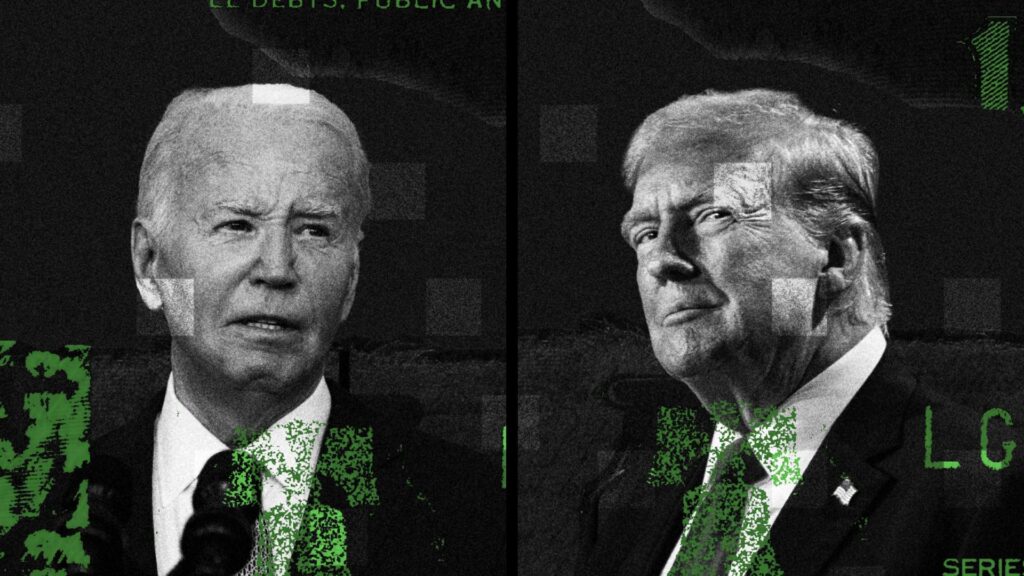During and after this week’s presidential debate, we must move beyond rhetoric and personality and focus on the core issues shaping America’s future. Most pressing are unsustainable increases in government spending and a ballooning national debt that will deprive Americans of wealth and living standards for decades to come. There is no doubt that this is a real crisis that requires immediate attention. Addressing this issue responsibly should be a litmus test of presidential leadership.
A recent report from the Congressional Budget Office (CBO) paints a dire picture. The projected deficit has climbed to alarming heights, far exceeding previous estimates. The current federal budget deficit is expected to reach $1.9 trillion by 2024, equivalent to an alarming 6.7% of annual gross domestic product (GDP). Even more troubling is the exponential increase in government spending compared to projections four years ago.
Back in 2020, the Congressional Budget Office predicted that federal spending would reach $7.5 trillion by 2030. The projected deficit in 2030 has also increased by about 25%, or $450 billion, over the four years. At the same time, debt accumulation is expected to increase by 20%. In 2020, the Congressional Budget Office projected that federal debt held by the public would reach $31.4 trillion by 2030. The latest report puts the figure at $37.9 trillion. However, by 2034, this number will increase by another $10 trillion to $47.8 trillion!
Contrary to what you may have heard, the rapid expansion of government is not simply a response to the recent crisis, although some of it does reflect an overreaction to COVID-19. More importantly, this expansion was the result of a fundamental shift in the scale and scope of federal activity.
Fiscal recklessness threatens the foundation of our economic prosperity. As government expands, it crowds out private investment, stifles innovation, and places an ever-increasing burden on future generations. Rising debt servicing costs alone—expected to reach $1.7 trillion annually by 2034—will drain an ever-increasing share of our national resources, leaving less money for critical investments in infrastructure, education, and research. In turn, the cost of these interest payments will be covered by more borrowing. That would fuel inflation and make the Fed’s job more difficult.
These are just a few reasons why rising debt makes us more vulnerable to economic shocks and geopolitical crises. It reduces our fiscal flexibility to respond to future recessions or national emergencies and could harm the dollar’s status as the world’s reserve currency.
Candidates who truly recognize the gravity of this situation and propose concrete, realistic steps to address it will demonstrate the leadership our country desperately needs right now. A serious president must commit to addressing this issue by examining every federal program and agency, eliminating layoffs, and delegating appropriate responsibilities to the state and local levels. More importantly, we need a thorough review of the entitlement program.
The latest data from the Manhattan Institute’s Brian Riedl shows things will get worse over the next 30 years, with cumulative deficits reaching $115 trillion, including $124 trillion for Social Security and Medicare (the rest of the budget Part will generate a surplus of $100 billion ($9 trillion). Basically, Social Security and Medicare are the problem, and if a candidate continues to claim that his administration won’t touch those programs, as President Joe Biden and former President Donald Trump did, then he shouldn’t be taken seriously.
For the long-term stability of the economy, we must have a solid plan to gradually reduce the debt-to-GDP ratio. This should include setting specific targets for deficit reduction over the next decade, implementing sequester spending reforms if fiscal targets are not met, and reforming the budget-setting process. While not a direct fiscal measure, reducing the regulatory burden on businesses can stimulate economic growth and indirectly improve our fiscal position by increasing tax revenues without raising tax rates.
As voters, we must demand that both candidates address these issues head-on during the campaign. Vague promises and populist rhetoric are not enough. We need a detailed, actionable plan to put America on a sustainable fiscal path. The candidate who rises to this challenge—who has the courage to speak honestly about the hard choices ahead and the vision to chart a path to fiscal sanity—will prove himself qualified to lead our country.
In these turbulent times, only by reining in the Leviathan of government can we ensure prosperity and freedom for generations to come. The stakes couldn’t be higher. Let us judge the candidates not by their charisma or mutual attacks, but by their commitment to doing what must be done. The future of our republic depends on it.
Copyright 2024 CREATORS.COM

